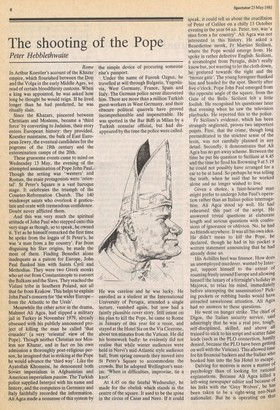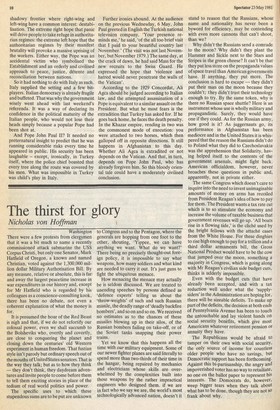The shooting of the Pope
Peter Hebblethwaite
Rome In Arthur Koestler's account of the Khazar empire, which flourished between the Don and the Volga in the early Middle Ages, we read of certain bloodthirsty customs. When a king was appointed, he was asked how long he thought he would reign. If he lived longer than he had predicted, he was ritually slain.
Since the Khazars, pincered between Christians and Moslems, became a 'third force' by converting to Judaism, their story enters European history: they provided, Koestler maintains, the bulk of East European Jewry, the eventual candidates for the pogroms of the 19th century and the extermination camps of the 20th.
These gruesome events came to mind on Wednesday 13 May, the evening of the attempted assassination of Pope John Paul. Though the setting was western' and Roman, the main protagonists were 'oriental'. St Peter's Square is a vast baroque stage. It celebrates the triumph of the Counter-Reformation Church. The 140 windswept saints who overlook it gesticulate and orate with tremendous confidence. Doubt never afflicted them.
And this was very much the spiritual attitude of John Paul who stepped onto this very stage as though, so to speak, he owned it. Yet as he himself remarked the first time he spoke from the loggia of St Peter's, he was 'a man from a far country'. Far from disguising his Slav origins, he made the most of them. Finding Benedict alone inadequate as a patron for Europe, John Paul flanked him with Saints Cyril and Methodius. They were two Greek monks who set out from Constantinople to convert the Balkans and the Slays. They reached the Vislani tribe in Southern Poland, not all that far from Krakow. This helps to explain John Paul's concern for 'the wider Europe — from the Atlantic to the Urals'.
Meanwhile the other actor in the drama, Mahmet All Agca, had slipped a military jail in Turkey in November 1979, already obsessed with his publicly announced project of killing the man he called 'that crusader' (a very 'oriental' view of the Pope). Though neither Christian nor Moslem nor Khazar, and in fact on his own admission a thoroughly post-religious person, he imagined that in striking at the Pope he would advance the 'third way'. Like the Ayatollah Khomeini, he denounced both Soviet imperialism in Afghanistan and American imperialism passim. The Turkish police supplied Interpol with his name and history, and the computers in Germany and Italy faithfully recorded the information. All Agca made a nonsense of this system by the simple device of procuring someone else's passport.
Under the name of Farouk Ozgun, he travelled at will through Bulgaria, Yugoslavia, West Germany, France, Spain and Italy. The German police never discovered him. There are more than a million Turkish guest-workers in West Germany, and their obscure political quarrels have proved incomprehensible and impenetrable. He was spotted in the Bar Biffi in Milan by a Turkish consular official, but had disappeared by the time the police were called.
He was careless and he was lucky. He enrolled as a student at the International University of Perugia, attended a single lecture, vanished again, but now had a faintly plausible cover story. Still intent on his plan to kill the Pope, he came to Rome in January of this year for a recce, and stayed at the Hotel Sia on the Via Cicerone, about ten minutes from the Vatican. He did his homework badly: he evidently did not realise that while winter audiences were held in Nervi's mid-Atlantic style audience hall, from spring onwards they moved into St Peter's Square to accommodate the crowds. But he adopted Wellington's maxim: 'When in difficulties, improvise, tie a knot'.
At 4.45 on the fateful Wednesday, he made for the obelisk which stands in the centre of the square. It used to be the spina in the circus of Caius and Nero. If it could speak, it could tell us about the crucifixion of Peter of Galilee on a chilly 13 October evening in the year 64 AD. Peter, too, was 'a man from a far country'. Ali Agca was not interested in this history. He asked a Benedictine monk, Fr Martino Siciliani, where the Pope would emerge from. He spoke in rather defective English. Siciliani, a seismologist from Perugia, didn't really know but, not wanting to let the cloth down, he gestured towards the right and the 'bronze gate'. The young foreigner thanked him and headed for the spot. Shortly after five o'clock, Pope John Paul emerged from the opposite angle of the square, from the Gate of the Bells. Siciliani felt a little foolish. He recognised his questioner later that evening when he saw the television playbacks. He reported this to the police.
Fr Siciliani's evidence, which has been strangely neglected, proves two important points. First, that the crime, though long premeditated in the strictest sense of the term, was not carefully planned in any detail. Secondly, it demonstrates that All Agca has no get-away scheme. Between the time he put his question to Siciliani at 4.45 and the time he fired his Browning 9 at 5.19 he could not possibly have arranged for a car to be at hand. So perhaps he was telling the truth, when he said that he worked alone and no longer wished to live.
Given a choice, a faint-hearted man might prefer to undergo John Paul's operation rather than an Italian police interrogation. All Agca stood up well. He had rehearsed this part of the script. He answered trivial questions at elaborate length and serious questions with confessions of ignorance or oblivion. No, he had no friends anywhere. It was all his own idea. He didn't mean to kill the Pope, he declared, though he had in his pocket a written statement announcing that he had already done so. His Achilles heel was finance. How does an unemployed murderer, wanted by Interpol, support himself to the extent of roaming freely around Europe and allowing himself the luxury of a fortnight's holiday in Majorca, to relax his mind, immediately before attempting the assassination? Picking pockets or robbing banks would have attracted unwelcome attention. Ali Agca had no answers to these questions. He went on hunger strike. The chief of Digos, the Italian security service, said admiringly that he was a real pro, tough, self-disciplined, skilled, and above all trained to stick to his script and scatter false leads (such as the PLO connection, hastily denied, because the PLO have been getting on well with the Vatican). This allowed time for his financial backers and the Italian who booked him into the Sia Hotel to escape. Delving for motives is more a matter of psychology than of looking for rational explanations. Because All Agca killed a left-wing newspaper editor and because of his links with the 'Grey Wolves', he has been taken to be a right-wing neo-Nazi nationalist. But he is operating on that shadowy frontier where right-wing and left-wing have a common interest: destabilisation. The extreme right hope that panic will drive people to take refuge in authoritarian regimes: the extreme left hope that the authoritarian regimes by their manifest brutality will provoke a massive uprising of the workers. Either way, the Pope was an accidental victim who symbolised the Establishment and an orderly and civilised approach to peace, justice, détente and reconciliation between nations.
So it had nothing to do with Italy as such. Italy supplied the setting and a few bitplayers. Italian democracy is already fragile and buffeted. That was why the government wisely went ahead with last weekend's referenda. It was a way of declaring its confidence in the political maturity of the Italian people, who would not lose their heads simply because a popular Pope had been shot at.
And Pope John Paul II? It needed no preternatural insight to predict that he was running considerable risks every time he appeared in public. His security has been laughable – except, ironically, in Turkey itself, where the police chief boasted that every tree along the route was covered by his men. What was impossible in Turkey was child's play in Italy. Further ironies abound. At the audience on the previous Wednesday, 6 May, John Paul greeted in English the Turkish national television company. 'Your presence reminds me,' he said, 'of the all too brief visit that I paid to your beautiful country last November.' (The visit was not last November, but November 1979). The same day, at the crack of dawn, he had said Mass for the new recruits to the Swiss Guard. He expressed the hope that 'violence and hatred would never penetrate the walls of the Vatican'.
According to the 1929 Concordat, Ali Agca should be judged according to Italian law, and the attempted assassination of a Pope is equivalent to a similar assault on the President. But what he most fears is the extradition that Turkey has asked for. If he goes back home, he faces the death penalty. In the Khazar empire, rending in two was the commonest mode of execution: you were attached to two horses, which then galloped off in opposite directions. It still happens in Afghanistan to this day. Whether Ali Agca is extradited or not depends on the Vatican. And that, in turn, depends on Pope John Paul, who has already forgiven him. So this bloody oriental tale could have a moderately civilised conclusion.











































 Previous page
Previous page